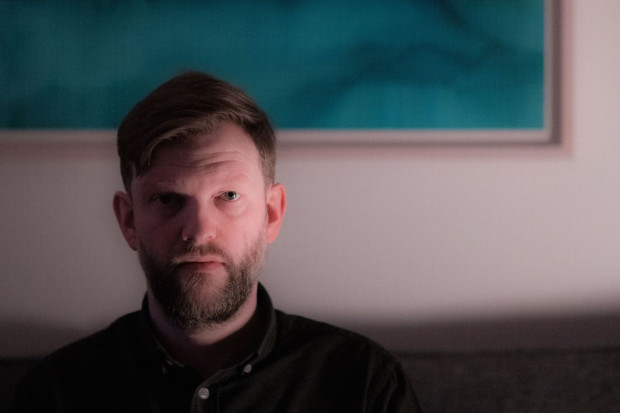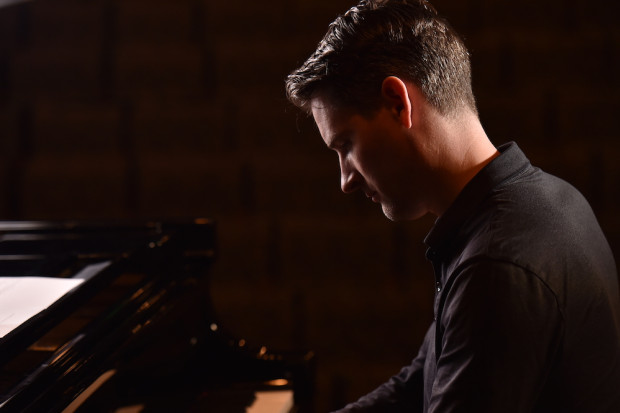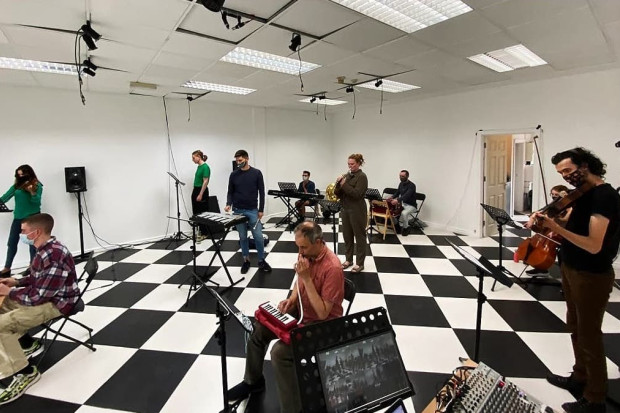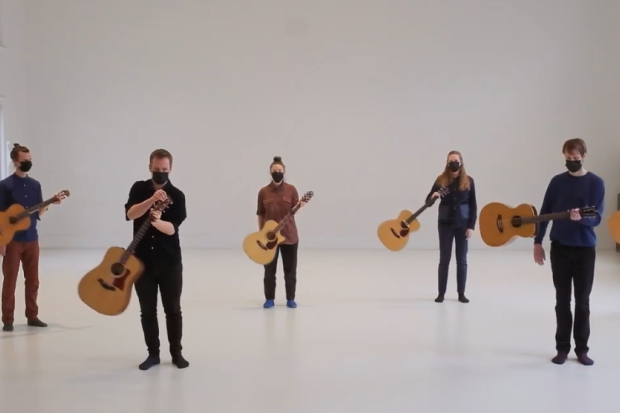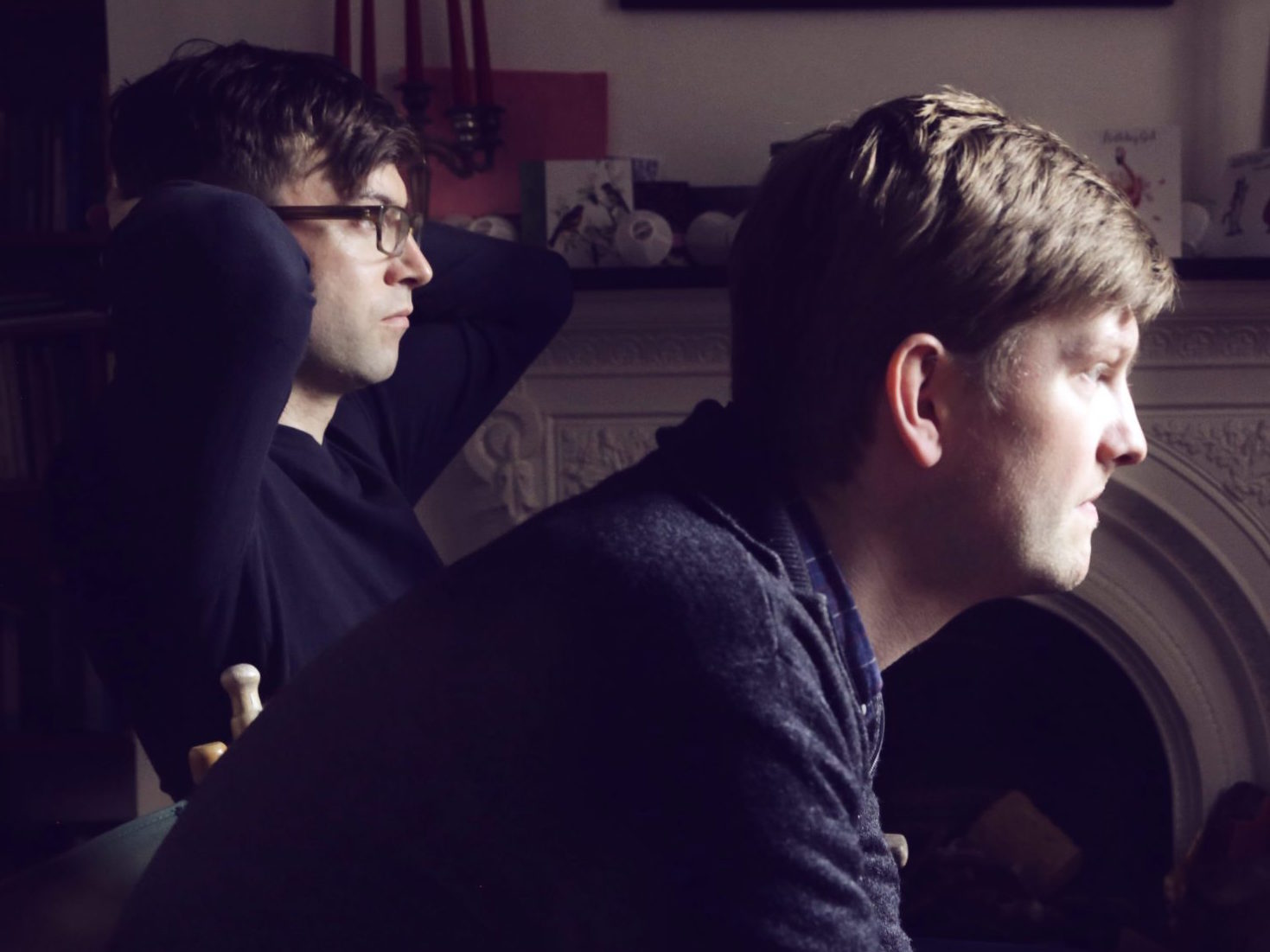
Benedict Schlepper-Connolly and Garrett Sholdice (Photo: Frances Marshall)
‘There’s an infrastructure that hasn’t been built overnight’: An interview with Benedict Schlepper-Connolly and Garrett Sholdice of Ergodos
In 2006, when Benedict Schlepper-Connolly and Garrett Sholdice were students at Trinity College Dublin, they began putting on concerts under the name Ergodos. They had recently met the American composer James Tenney, who had visited Trinity, and the name came from one of his works. ‘Ergodos’ stems from ‘ergodic’, a branch of mathematics that refers to – among other things – ‘touching all points’ in a set. In the early days, the two often quoted the Tenney maxim that inspired their initiative: ‘Do what you have to do, and do it soon.’
Their output was wide-ranging. First years featured events such as the ‘Off-grid’ festival, which gave an early platform to Caoimhín Ó Raghallaigh’s experimental approach to traditional music, as well as featuring a Gamelan orchestra, the Irish premiere of Tenney’s In a large, open space, and work by Judith Ring.
In 2010, they began releasing recordings – it ‘grew out of almost an archival spirit’ – and Ergodos has since released 30 recordings in all formats that range from the finely balanced chamber music of Kevin Volans to the forcefulness of Frankie Gavin’s fiddle-playing. Central, however, has been the label’s documentation of a sweep of new Irish composers and experimental musicians, including Linda Buckley, Judith Ring, Seán MacErlaine, Michelle O’Rouke, David Collier, Jonathan Nangle and Simon O’Connor.
Amidst this, the pair also formed the Ergodos Musicians ensemble for their Songs project, and, with singer Michelle O’Rourke, formed indie group There is an Island, in which they sing and play keyboards, guitar and violin. In 2012, they presented the premieres of two of their own operas. The composers have released their own music too, including Schlepper-Connolly’s unique 2016 statement with ecological resonances, The Weathered Stone. Their latest release, featuring Sholdice’s work Winter, is described, in Brendan Finan’s Journal of Music review, as achieving something all too rare in classical music recordings.
A space, a little corner
As well as being a label, however, Ergodos has also gained a reputation for thoughtful, crafted concert performances, notably their Santa Rita series at the Little Museum of Dublin, which is now in its fifth year. Their ‘Morning Rituals’ event at the recent New Music Dublin festival, which featured four performances in venues including a Real Tennis Court, prompted Adrian Smith in the Journal of Music to write: ‘when it comes to presenting contemporary music in an engaging and intimate manner… [Ergodos] are in a league of their own.’
And yet, according to Schlepper-Connolly, there was no clear plan for Ergodos when they began presenting concerts in 2006.
I don’t think it was very ambitious. I think it was really just trying to get a space, a little corner to put our stuff in. … We created a platform, which has grown over time, but I don’t think we had any great ambitions.
Their first album release in 2010 was titled Dubh (‘Black’) and featured Trio Scordatura (with the late Bob Gilmore on keyboard) performing work by seven young Irish composers. The same year, with Ireland deep in the economic recession, they hosted the Ergodos festival MMX. The counter-cultural festival programme read: ‘We believe that, in spite of the hardships of our time, there is much to celebrate, much that is beautiful, much to give us hope, and much to be done.’
DIY energy
When Ergodos began, the energy in Dublin was quite different. According to Sholdice, ‘There was a great atmosphere. There was a lot of things going on. Crash Ensemble were just coming up to ten years. Donnacha Dennehy’s energy was very palpable – that sense of DIY energy. There was excitement around the Young Composers’ Collective…. It was just on the crest of the boom as well. I have no idea if Ergodos would ever have started if we had begun two years later. We just flew in on the edge of a wave….’
In recent years, the label reached another level when they opened the Ergodos Studios in Dublin city centre, which served as a production house and recording studio as well as a work space for a range of artists. They also had by then announced a global distribution deal for their albums.
However, despite these achievements, the lack of a clear Arts Council policy with regard to recordings has stifled the potential development of the label, meaning that Ireland still has no full-time label for contemporary music.
‘One thing that we’ve found in the last few years,’ says Schlepper-Connolly, ‘is that there’s a huge amount of infrastructure that’s been put in place over the years, everything from a distribution network through to financial systems. There’s an infrastructure that hasn’t been built overnight, and in a way that’s one of the biggest values to the Irish community of musicians. Apart from the fact that it’s a curated label and there’s an artistic function to the label, I think there’s a structural function which is really valuable.’
Sholdice, too, can see the importance of this development over the years: ‘You don’t figure out how to manage a release from inception to a vinyl pressing the first time you do it. There’s a lot of that knowledge there now that’s infrastructural – how you have a series of conversations with artists across the life cycle or gestation of a project, for example. All of that doesn’t happen overnight.’
Skills and support
Has the label received the support that it needed to build on its work so far? ‘Honestly speaking, no,’ says Schlepper-Connolly. ‘There are projects that have happened on the label that couldn’t have happened without support from the Arts Council, but … the infrastructure has never really been supported by the Arts Council.’
As a production house as well as a record label, the creative infrastructure is broad and includes many components: skills such as working with musicians in studio, engineering expertise, a financial infrastructure, a royalty system, media relationships that have been built up over years, distribution and manufacturing networks, workflows and design knowledge.
The Arts Council promised development of its music policy in 2018, but it has not been published yet. The advantage of a new policy would be that it would take into account support for recordings and labels and feed into funding decisions, but without it, the significance of label work can get overlooked. There is also the fact that Arts Council funding is still lower than its 2007 level, which means it has less flexibility to take on new funding clients.
Schlepper-Connolly continues:
Especially since the recent policy changes in the Arts Council [the 2016–25 Making Great Art Work strategy]… we have been doing everything in our power to knock on that door, and we’ve just been turned away… repeatedly. It got to the stage where it was really frustrating because here we were with this infrastructure that we built and which is essentially a ready-made vehicle and resource for a whole community of Irish musicians.
The last few years have seen Ergodos obtain a reach where they were able to take on all aspects of the release of an album, and recordings like Seán MacErlaine’s Music for Empty Ears received notable international attention, described by the Wire as having a ‘distinctive voice all its own’.
Labels in an ecosystem
Schlepper-Connolly sees part of the challenge as the fact that recordings are treated differently in arts funding, whereas Ergodos see them as intrinsic to the development of an artist’s work.
The Arts Council have their point of view on recordings being separate from other kinds of work, but I would see a record label as being part of a really rich ecosystem for music…. If you take that away, and you don’t feed that aspect of it, you take away a whole range of other possible benefits to both musicians and listeners. I think there are very strong arguments for labels, and not just for ourselves. There are plenty of other great labels in Ireland, like Diatribe and Raelach.
The two composers have seen how views of recording have waxed and waned since the development of digital distribution, but the demand for recordings as an artistic document is still there. Sholdice adds:
The importance of recorded music doesn’t decrease, even though over ten years we’ve seen a very marked decrease in the feasibility of monetising recorded music… We just fundamentally believe in the value of high production values and high-quality recorded documents, and everybody seems to as well. There’s a gap there which is the economic issue.
Key to the next phase in recording is to think beyond the format, says Schlepper-Connolly. ‘I don’t know if things have settled down, but people who are still doing it have stopped fighting the change and are working with the reality. I think we probably feel relatively positive about the way it’s distributed now.’
We’ve always had the attitude that we want the music to be in the room where the people are listening to it. If that means being on every possible platform and sometimes taking a financial hit because of that, I think that’s OK.
Earlier this year, Ergodos did their first digital-only release in several years, A New Sea, with no physical release tied to it, and ‘that felt really free’. They also note that the returns on downloads and streaming are improving.
The result of the unsure nature of support for specialist labels, however, means that both have now moved into other areas, Schlepper-Connolly as Digital Curator with the Museum of Literature Ireland (MoLi), and Sholdice as a freelance music lecturer, while both are also running the label and concerts.
The current situation removes some of the financial pressure on the label, to provide financially for us. It’s going to be a lot safer for the label, to ensure its longevity. But if you were trying to run the label the way we have been doing it, you just couldn’t do it.
Ergodos’ latest release, Winter, is available at www.ergodos.ie
Published on 8 May 2019
Toner Quinn is Editor of the Journal of Music. His new book, What Ireland Can Teach the World About Music, is available here. Toner will be giving a lecture exploring some of the ideas in the book on Saturday 11 May 2024 at 3pm at Farmleigh House in Dublin. For booking, visit https://bit.ly/3x2yCL8.












